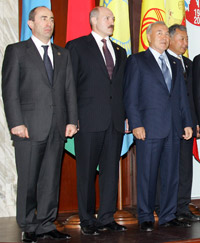Judging from certain signs, 2007 may be the last year for the CIS. The CIS gave up on effectiveness of an interstate alliance in politics a long time ago and is now giving up on economic relations benefiting countries. If we leave political correctness aside, we can say that there was only one thing that meant beneficial economic relations starting from the creation of the CIS: CIS member countries taking advantage of Russia . This refers to the supply of power-engineers with special conditions, free export of the minimum amount of products of the CIS countries to the Russian markets and the import of Russian products for which there are various obstacles. For example, during the past couple of years, some CIS member-countries are setting bans on Russian beer imports. However, there is an extremely large amount of beer produced in Russia and that, in economic terms, is called super production. Besides that, it turned out that besides one or two CIS member-countries, the rest are in favor of a one-sided game-while accepting the fact that Russia has interests in the region and even accepting how standardized and sound they are, they also didn’t want to come face-to-face with the reality. This simply disgusted Moscow . It’s logical that Moscow started to occupy itself with fixing the situation at hand either directly or through the means of its industrial structures. In fact, in some cases, you got the impression that Russia was already bored of the CIS. That’s why the President of Russia Vladimir Putin called the CIî a tool for a civilized divorce of the former Soviet states and talked about the need to create bilateral relations during one of his speeches.
Russia’s positions in Central Asia seem rather strong. Tajikistan and Kyrgyzstan have always remained loyal to Moscow and nothing points in the other direction. After the indifferent behavior of Russia towards the idea of the CIS, it seems as though Kazakhstan is inclined to become the main mobile force for integration ideas in the post-Soviet region. The strong and dynamic economy of Astana allows the country to talk to Moscow face-to-face equally, but at the same time it doesn’t open its borders. Uzbekistan was forced to go along with the slaughter of Andijan so that it could review its foreign policy and direct itself towards Russia . After the death of Turkmenbashi, the presumed Turkmenistan will become an even more open state. Although the 25-year natural gas import contract signed by Moscow and Ashgabat is still in effect, the strong relationship between the two will stand the test of time; if, of course, some political party with high hopes and vague ideas wins in the upcoming elections.
The situation is not that easy in the South Caucasus . Armenia is still Russia ’s “strategic ally” although it has handed over its economy to the country. Besides capricious Georgia , we now have Azerbaijan , which really has high hopes for its energetic resources. Whereas Tbilisi has been slapped from left to right with blows from Moscow and, as a result, the only ties left are the humanitarian ties, Baku has been hit with the migration “bludgeon”: until April of this year, Russia will apply new laws for trade regulation, after which, based on the approximate calculations of sociologists, approximately 1.5 million Azerbaijani can return to their homeland. The prospective is so melancholic that Baku has formed a governmental delegation to lead negotiations with the Kremlin.
Setting a ban on the import of Moldovan wines and fruit was enough for obedient Moldova concerning the issue of Near Dnester. There is no longer a ban and now both sides are getting ready to restart trade. It’s simply a matter of time and depends on how long it will take Moldova to get back the popularity of its wines, which was stolen by rather cheap and high-quality South American and Australian wines during the trade gap. The oil/gas mutiny of Minsk during the holidays showed how ineffective those tries are, at least in this stage. The resistance continued for a couple of days and we must assume that Moscow finally did not wish to eliminate its rebellious ally and made insignificant compromises in order to save the face of Belarus with which there is still a plan to create a unified state.
Perhaps the more interesting relations are the relations between Russia and Ukraine . The resolution of the conflict between pro-Russian Prime Minister of Ukraine Yanukovich and pro-Western President of Ukraine Yushchenko will determine the future of the relations between Ukraine and Russia . Moscow , which had supported Yushchenko’s coming to power, is now waiting to see what will happen from the outside.
In a word, Russia showed that it has its methods of influence on each of the CIS countries; for some politics, for some energy, for some migration and so on and so forth. True, it’s not always that the result is 100%. However, we’re not talking about results for the time being, but rather tendencies and, in some sense, the methodology of constructing bilateral relations with which Moscow , judging from everything, is planning to substitute for the deformed and ineffective system applied for CIS relations.

